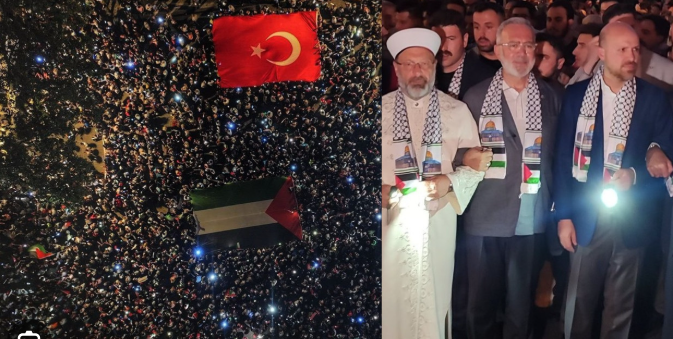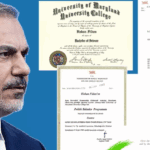Recep Tayyip Erdoğan has built his political career on a blend of Islamic ‘solidarity’, populist rhetoric, and shrewd political choreography. Now, as Turkey’s long-serving president enters his third decade in power, the stage is being set for a new chapter — one in which his son, Bilal Erdoğan, increasingly occupies the political spotlight. The August 9 “Be a Light of Hope for Gaza” march in Istanbul offered more than just a display of ‘solidarity’ with Palestinians. It was, in many ways, a carefully crafted showcase for Bilal’s growing public profile.
The march, organized by the Support for Palestine Platform, drew thousands from Beyazıt Square to Hagia Sophia — a route steeped in meaning for Turkey’s religious and nationalist base. Bilal Erdoğan, serving as chairman of the İlim Yayma Vakfı board of trustees, was among those calling for the rally, standing shoulder to shoulder with other prominent figures, including his brother-in-law, Baykar defense executive Selçuk Bayraktar. It was a scene heavy with symbolism: the president’s son and son-in-law leading a cause rooted in Islamic heritage, Ottoman nostalgia, and the Palestinian struggle — all core themes of Erdoğan’s political identity.
It was not Bilal’s first time in such a role. Back in January, he had helped spearhead a similar Gaza solidarity march on Istanbul’s Galata Bridge, again placing himself at the forefront of a movement that blends religious sentiment with political messaging. The August rally, like the one in January, underscored his growing role as a public face for causes that resonate deeply with the AKP’s conservative base.
Just hours before the march, he sat for a lengthy interview on Habertürk TV. The visual and auditory echoes of his father were striking: the same deliberate cadence, the same moral-political framing, the same ease in pivoting from local symbolism to global critique. “We thought holding the march in the evening would both increase participation and create beautiful visuals,” he explained, openly acknowledging the event’s media-conscious design. “The Palestinian issue is truly a matter of human conscience… We’ve reached a point where we must ask: is humanity’s conscience dying?”
Bilal’s commentary was not limited to poetic lamentation. He directly accused the West of moral failure, noting that “those who speak most about democracy” have the power to stop Israel’s actions but choose not to. He pointed to the entrenched influence of the pro-Israel lobby in the United States, the weight of Holocaust guilt in Germany’s foreign policy, and recent cracks in this consensus, such as Berlin’s decision to suspend certain arms sales to Israel.
This is vintage Erdoğanism — the fusion of moral outrage, geopolitical critique, and civilizational framing — but now articulated by the president’s son. In a telling moment, Bilal shared a story his father once told him: During the U.S. war in Vietnam, an old man stood outside the White House every day, lighting a candle. A journalist asked why he did it, knowing it wouldn’t change anything. The old man replied, ‘I know I can’t change them—but I don’t want them to change me.’ That, Bilal said, is the essence: to stand firm, to be part of the story, to keep the memory alive, and to pass it on to our children.”
The effect of this performance was twofold: it reinforced the AKP’s positioning as the moral vanguard of the Muslim world, and it tested Bilal’s ability to inhabit a role that combines humanitarian rhetoric with political mobilization. His discourse ranged from calls for greater media production on Palestine — “Why can’t we make a powerful film about a Palestinian child’s story?” — to critiques of Israel’s decades-long regional strategy of weakening neighboring states. He invoked the late Islamist leader Necmettin Erbakan’s warnings about Israeli ambitions, explicitly situating himself in the ideological lineage that shaped his father’s early political career. He also claimed that Israel has spent decades undermining countries across the region — from Iraq to Syria to Libya — to secure its own freedom of action. He noted that Erbakan Hodja had warned about this 40 years ago, yet despite witnessing it unfold, the region still cannot act decisively. What he failed to acknowledge, however, is that every one of these events took place during his father’s tenure — and in each case, his father was not merely a bystander, but a key actor.
The infrastructure supporting this positioning is extensive. Bilal’s leadership of TÜGVA and the İlim Yayma Vakfı places him at the center of networks that cultivate conservative youth, religious educators, and community organizers. These institutions function like political greenhouses, nurturing loyal cadres who can later assume roles across public institutions and civil society. Within this framework, Bilal has come to be seen by many as an “undeclared crown prince,” exercising considerable influence without holding elected office. The broader system — built on the centralization of power, the capture of institutions, and the tight integration of civil society into the ruling network — is well suited to facilitating such a succession from within.
Critics, however, see danger in this trajectory. Gaza’s tragedy, they argue, is being instrumentalized for domestic political purposes. The government’s selective tolerance of protests supports this view: the August 9 Istanbul march, attended by AKP figures and aligned with official messaging, was celebrated. Yet in Ankara, just hours earlier, police detained five activists attempting to deliver a letter to President Erdoğan demanding a full break in trade with Israel. These activists were released without charge, but the message was clear — public dissent is welcome when choreographed under the auspices of the Turkish government; disruptive or independent mobilization is to be contained.
On paper, Ankara declared a sweeping embargo on Israel in May 2024. In practice, Israeli import data tells a different story: nearly $400 million in Turkish goods flowed into Israel between January and May 2025. For critics, the numbers speak louder than the speeches. They point to indirect trade routes quietly keeping business ties alive, even as the government wraps itself in the moral banner of Gaza. To them, this is the telltale gap between words and deeds — proof that those grand solidarity marches may be more about political theatre than about changing policy on the ground.
Yet for the AKP’s core electorate, this may not matter. What they see is a seamless continuity: Bilal Erdoğan walking the same routes, delivering the same messages, projecting the same identity as his father. The Gaza cause is not just a moral rallying point; it is a vehicle for political inheritance. By linking himself to a cause that carries deep emotional weight for the conservative base — and framing it in language of both historical grievance and modern activism — Bilal is positioning himself as the natural heir to the Erdoğanist project.
History has a way of repeating itself when it comes to political succession. From the Ottoman court to the modern capitals of the Muslim world, the path to power often begins long before an official title is bestowed. It starts with a kind of public apprenticeship — leading symbolic causes, mastering the art of speaking to the masses, and quietly building influence through tightly knit networks. On all three counts, Bilal Erdoğan’s current path fits the mold. The Gaza marches are more than acts of solidarity; they are a stage from which he can speak the language of moral leadership while remaining firmly rooted in the ideological and institutional world his father has spent decades constructing.
This pattern is not unique to Turkey. In Azerbaijan, Ilham Aliyev’s rise to the presidency in 2003 was smoothed by years of high-profile diplomatic work and key roles in his father Heydar’s political machine. In Syria, Bashar al-Assad — initially reluctant to enter politics — was brought in through carefully chosen symbolic assignments and foreign policy duties before stepping into power after his father Hafez’s death. And in Pakistan, the Bhutto family shows how legacy can be both a blessing and a burden: Bilawal Bhutto Zardari stepped not only into the leadership of his party but into a lineage steeped in sacrifice, loyalty, and emotional resonance with its base. In each case, the heir’s legitimacy grew from controlling the political narrative, commanding an organizational machine, and tying themselves to causes that stir deep public feeling.
What makes the Turkish case stand out is its particular mix: the populist Islamism of the AKP, the potent imagery of Ottoman revivalism, and a global humanitarian cause — Gaza — at the very heart of the succession stage. It’s a combination that speaks directly to Erdoğan’s domestic base while also appealing to audiences far beyond Turkey’s borders. In this framing, Bilal is positioned not simply as the president’s son or even as a future national leader, but as someone carrying a mission that crosses frontiers, a figure whose claim to leadership is tied to a cause that millions across the Muslim world see as their own.
Whether this will translate into real political authority remains an open question. Turkish politics is unpredictable, and Recep Tayyip Erdoğan has long been adept at keeping potential rivals — even family members — in a controlled orbit. But the convergence of imagery, rhetoric, and institutional power suggests that the Erdoğan era may not conclude with the man himself. Instead, it may evolve into a dynastic project in which Gaza’s tragedy is both a foreign policy rallying cry and a domestic succession platform.
By: News About Turkey (NAT)



